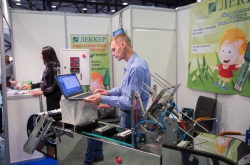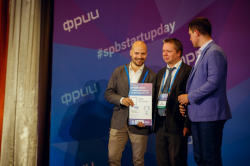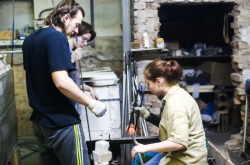What is TechNet?
TechNet is part of the National Technology Initiative, which is, in essence, a campaign aimed at making Russia secure positions as a global leader in several high-technology markets, including car manufacturing, aircraft engineering, shipbuilding, and others. TechNet will contribute to the development of the "factories of the future" which will make use of cutting-edge technologies by creating the conditions for the development of user-focused products that will be able to compete with foreign counterparts on a global level.
Factories of the future
Even now, a company’s competitive ability depends on more than just its basic technologies. For instance, if some car manufacturer releases a unique model of headlights, those will be soon copied by its competitors. In future, one will be able to retain leadership positions by adding some intellectual component to the product. It's also important for the product to be user-focused, as well as to develop it in the least time possible.

To attain that, companies will introduce new technological processes. Firstly, they will start developing "digital doubles" of products, manufacturing processes, and equipment, i.e. computer models of the manufacturing processes and conditions, as well as the products' life cycle from their development to recycling. This means that the "double" will go through everything the product is supposed to go through, only in a digital environment. Thus, the developers will be able to understand more about the product during its development stage. Thanks to that, they will have the opportunity to create customized high-technology products for particular users.
Secondly, companies will gradually introduce unmanned "smart" factories that will make use of robots, sensor systems and IIOT (Industrial Internet of Things). Thirdly, they will place more focus on outsourcing. To produce some product, a holding company will no longer require traditional manufacturing and marketing processes; such tasks will go to smaller specialized companies. "Virtual factories" will help small and medium businesses fit into the production chains of major international companies.
"It will be important to follow global trends. Even now we need to restructure our industry by shifting the focus to the field of development. Everyone will have common manufacturing processes: robots, machinery, continuous flow manufacturing; everyone will aim for decreasing costs. Yet, how does one raise their competitive ability? By investing intellectual resources during the development stage. What is more, it will be important to comply with the three requirements of the global market: Time-to-Decision (decreasing the time spent on decision-making), Time-to-Execution (decreasing the manufacturing time) and Time-to-Market (decreasing the time spent on bringing the product to the market)" notes Alexei Borkov, co-head of TechNet workgroup and Vice-Rector on Promising Projects atSt. Petersburg Polytechnic University.
 Alexei Borkov
Alexei Borkov
This is where startups come into play
TechNet is one of the seven tracks of the GenerationS acceleration programs that brings together the best developers in the field of hi-end manufacturing technologies. Promising startups get the opportunity to develop their projects alongside the representatives of National Technology Initiative's TechNet workgroup and UEC-Saturn - the track's industrial partner.
"In the new economic conditions, it matters how fast companies can add new qualities to their products and improve their manufacturing technologies. A single company can no longer track all market changes, so we need new startups that will quickly react to new opportunities. In our accelerator, we monitor how every particular technology proposed by the startup's team can be fixed into our production chain. Each competence can be applied in some way, depending on which field it can be commercialized in, - this is what innovations are about. For instance, we are interested in new materials, composite materials manufacturing, and such" comments Dmitry Ivanov, co-head of the TechNet workgroup and UEC-Saturn's Innovative Development Director.
What kind of projects will be selected for acceleration?
All of the ideas for the TechNet track are to have a promising competitive ability on the global market. To attain that, the following fields are to be developed: digital development and modeling, new materials, IIoT, sensor systems, robotics, additive technologies and other.
"The development of new technologies invigorated the process of restructuring the existing industrial estates. The processes and systems they currently use are totally outdated. TechNet track is looking for hi-end technologies that can change the current state of industrial enterprises. Though UEC-Saturn is the track's main customer, it works for the benefit of the whole industrial sector. Its potential members are expected to actively participate in the track's workings in general: attend different events, communicate with its members, build communications. In essence, one doesn't have to be a representative of a startup or a company - social activism is enough to enter any of NTI's workgroups," comments Oleg Malsagov, representative of the GenerationS accelerator and Advisor to ITMO University Rector.
 GenerationS participants
GenerationS participants
What are the benefits of participating in the TechNet track of the GenerationS accelerator?
There have already been teams accelerated as part of TechNet. One startup team developed the new Robot Control Meta Language (RCML), which can be used to program robots by different manufacturers to work on a common task. The startupers have successfully demonstrated their project to experts and investors and were invited to collaborate with UEC-Saturn; St. Petersburg Polytechnic University awarded the team a trip to Germany where they will have the opportunity to get support from European investors. This way, the startup started to develop on the international level.






